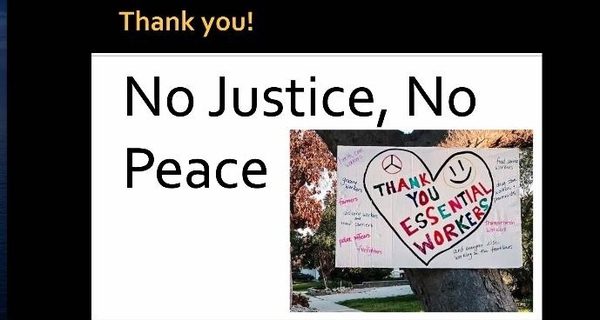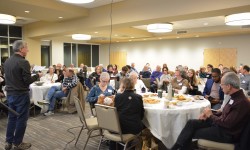One of the once ubiquitous 'thank you' posters from early on in the pandemic greeted people on the Zoom call.
By James Kinneen
Hometown Weekly Reporter
On Sunday night, a group of organizations held their eleventh At My Neighbor’s Table event of the year - although this was only the third one that took place over Zoom. Among the myriad sponsors were the League of Women Voters Westwood/Walpole/Dedham, Inclusive Westwood, and Progressive Dedham/Norwood/Westwood.
While there are obvious overlaps in content covered and issues brought up (past events from this year have centered around unpacking structural racism, which was brought up as well on Sunday), this edition centered around essential workers and was titled “What Would Our Communities Look Like if we Valued Essential Workers.”
To begin, Reverend Nick Morris-Kliment offered a brief thought about how evert religion involves loving one's neighbor as a foundational tenet, before citing a Boston Globe article that said about essential workers “they kept us going.”
“Note the past tense” he explained. “This conversation is meant to change those verbs to the present and future tense, because these neighbors continue and will continue to keep us going after this crisis is over. We need to find sustainable and substantial support for them.”
The first speaker was Smitri Rao, a feminist economist and professor at Assumption College who has lived in Needham since 2007. Rao began by noting that “essential worker” was originally an academic term that involved women’s often unpaid work, like “cooking, cleaning, and raising kids” until COVID-19 led to its being used for workers who, according to the official government definition, “promote the public health and welfare of commonwealth.”
While you likely think of a nurse, doctor or teacher you know when thinking of an “essential worker” in Massachusetts, Rao pointed out that the majority of those deemed essential workers are in “unskilled” labor who are “systematically undervalued and underpaid in labor markets” whose “usefulness seems to be more than its exchange power on the marketplace.” This poses the uncomfortable question of whether “in today’s economy, does 'essential' mean 'essentially disposable'?”
Rao noted that the problem with the supply-and-demand argument is that labor markets are embedded in, reproduce and amplify large structures of power, which can create a “toxic soup” reflected back through labor markets.
The big issue is that the more vulnerable a worker’s race, gender and immigration status make them, the less bargaining power they have and vice versa (essentially more privilege means more bargaining power). Still, for the first time possibly ever, she noted, there is a test of the American system as the vaccine is supposed to go to essential workers before the rich, meaning for the first time ever, a bus driver is in line for something ahead of a wealthy banker.
The idea of being more vulnerable leading to having less bargaining power was the main focus of Director Diego Low of the MetroWest Worker Center's presentation. Noting that he would “restrict myself to speaking about one sector who I have particular experience with, the immigration community,” Low used a couple of personal anecdotes to demonstrate how we don’t readily realize how we don’t see undocumented people in our cities. As an example, he noted that because they cannot get driver’s licenses, one of the cities in the MetroWest area's drive-through COVID testing site was essentially worthless to the undocumented community, and that although they immediately corrected the issue, it showed there was a blind spot.
Other examples included how when he was spending time in the mushroom growing country in Pennsylvania in the 1980s, as soon as the Puerto Rican workers began to organize, they were replaced with undocumented Mexican workers. Another example involved how a foie gras factory inspired huge backlash over its treatment of geese, while little attention was paid to the undocumented workers who were sleeping only three hours a night to maintain those heinous feeding schedules.
Low sees what he calls a “looming human crisis” on the horizon, as the undocumented community had “no access to stimulus or unemployment funds. There’s no surer way as an undocumented worker to get yourself in trouble than to apply for unemployment.” As soon as more massive layoffs come, combined with the end of the eviction moratorium, more people are going to pack into small apartments and fill houses, which will likely help spread the coronavirus even further.
After the two speakers, observers assembled in confidential groups to discuss the issue and possible solutions, then came back and discuss what they talked about. One person noted that the issue is so little understood that on Facebook, people are posting that they’re putting out snacks for essential delivery men, rather than posting about bills that could stop evictions or something far more helpful.
As a closing thought, while both speakers backed increasing the federal minimum wage, Diego pushed for both undocumented workers drivers licenses and an eviction moratorium, while Rao expressed more optimism, pointing out that Massachusetts had made strides in healthcare and paid family and medical leave.























